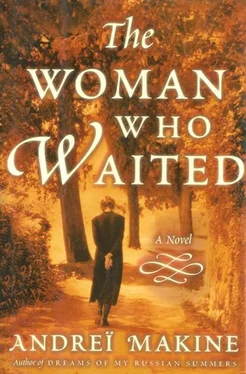A log exploded, a shower of sparks fanned out onto the floor. She turned her face toward me, spoke in a voice that was suddenly grave.
“The other day I found a letter from Otar. I expect you brought it… The first real letter in thirty years. He talks about those very things: exclusive attachment, faithfulness, waiting. He says he’s ready to wait. To change his life completely. Come back to this territory where he was once ordered to reside. Live in Mirnoe. With me. And leave if the other one (‘the man who must return,’ he calls him) did come back…”
Her lips were half open; she was breathing in little gasps, as if she had been running. That was precisely the impression she gave me, of a race, a headlong flight that would end in a collapse, a long cry of pain, tears.
In clumsy haste I asked: “And are you going to re-ply?”
She gave me an astonishingly lucid, almost hard, look: “I already have.”
“And…”
“And the answers no. For the one who must return will return. Otherwise love’s nothing but a glass of water gulped down, the way our fair Alexandra used to describe it.
She smiled, got up, went in search of her coat. Emerging from my torpid state, I held out the long cavalry greatcoat for her. Its folds gave off a cold, wintry breath. With casual warmth she bade me good night, kissed me lightly on the cheek. Only the tiny quivers at the corners of her mouth betrayed what she was managing to control.
I stayed outside until she had reached the front steps of her izba . She walked slowly, giving the impression of holding in check an impulse to run, to escape. The beam of the flashlight she swung distractedly back and forth across the path sometimes veered upward, and its light collided with the bleak infinity of the sky.
I ARRIVED BEFORE the start of their concert to witness the rehearsal unobserved. The old marriage ritual was already more or less known to me. What I particularly wanted to see was the tentative emergence of the roles, the haziness of forgotten movements suddenly being reborn in the bodies’ memories. I was curious to hear the ancient voices, blending together little by little, overcoming the silence of some years… I walked around the izba , formerly the village library, where the performance was due to take place, and crouched down beneath a window. One of the four panes was broken and had been replaced with plywood, so I could clearly hear what was being said inside.
All Mirnoe’s “regulars” were there, seven women who had put on long dresses from another era, flowered shawls. White, russet with gilt threads, black. Country finery whose worn fabric and faded colors could be made out even through the window. Katerina, tiny and shriveled, wearing a kind of orange sarafan that was too big for her, was conducting the choir with her back to the window. The others, arranged in a semicircle, their arms folded over their chests, were obediently following her instructions. The status of conductor fell to her quite naturally: Katerina was the only one with complete recall of the songs and steps that made up this ritual from days gone by.
They were preparing to perform it at the request of the great Leningrad scholar that I was in their eyes, an unintended fraud.
As it happened, the rehearsal was frequently interrupted by brief but vehement arguments on the subject of myself. Or rather my relationship with Vera. There were two opposing opinions: though I was viewed by some, the majority, as a dangerous and unprincipled intruder, in the eyes of my two supporters I became “a good fellow who chops wood better than most.” Katerina, destined by her role to be the mediator, cited my exemplary conduct when I carried her through the forest, but nevertheless agreed that “folks from Leningrad these days have hearts of stone, like that city of theirs.”
If the truth be told, passing judgment on my worth as a human being was for them no more than a way of alluding to the contradiction that none of them dared face up to: if they learned that a new love affair had just put Vera’s faithfulness toward her soldier at risk, their world, founded on the cult of the victims of the war, would have collapsed. And yet, as women who had suffered so much loneliness, they could only wish for her to be loved, even if it meant succumbing to an untimely, tardy love, with scant regard for tradition, a love that would be both her salvation and her ruin. I noted that the two evenings spent in Vera s company had sufficed to establish me in the minds of the women of Mirnoe as an ardent and persistent lover. At no point did they refer to the age difference between us. Since almost all of them were in their eighties, they perceived us as a couple in which my three months’ beard perfectly complemented the youthful glow that Vera’s features radiated.
“With love it’s like the spring floods,” declared Katerina. “There’s no help for it. Even if it’s fall now…”
Several voices objected, but she banished their protests with an elegant rippling movement of her hands, and the choir struck up, already in almost perfect unison. And when, as the soloist, she made her responses to them, in an astonishingly clear and firm voice, their earlier squabbles seemed trifling, just a little warm-up for the vocal chords.
“He’ll come from beyond the sea, beyond the White Sea, vast and chill,” sang Katerina. And the choir took up the theme: “From beyond the White Sea he’ll come.”
“He’ll come bringing the dawn. He’ll find it where the sun goes down. He’ll bring it for you, from beyond the sea.” Her voice became increasingly dreamy, and the choir responded in an even more remote echo, marking the distance the traveler had come.
“Zoya, you’re always a little bit behind. Do try to keep up. Otherwise they’ll think you’ve gone to sleep.” Katerina stopped the choir. The women stirred. “They’ll think…” They was me. I slipped along under the window to approach the building from the front, and before knocking at the door, I made the sound of heavy, noisy footfalls on the front steps. The conductor of the choir came to let me in. Her pale cheeks were colored by the excitement of the dress rehearsal.
At first, I found the first public performance less moving than that rehearsal. The presence of an audience, in the shape of myself, made the old women more stiff, needlessly solemn. But on the other hand, perhaps by finally losing themselves fully in their performance, they had attained the hieratic ponderousness that this ceremony of bygone days demanded-a heaviness of plowed earth, the rigidity of wooden idols, the pagan totems their ancestors used to nail on the porches of their izbas . Acting out the scenes of the marriage, they moved with the menacing weight of living statues.
Their voices, in contrast, rang out with a disarming sincerity and sweetness, with an expressiveness that, as always with amateur performers, revealed more of their own personal emotions than those of the characters.
At one moment this distance between the performance of the ritual and the truth of the voices became painful. The bodies were acting out the fiancé and his chosen one boarding a ship and preparing to cross the White Sea. It was easy to imagine that, in reality, this epic voyage was taking place not at sea but on the lake that bordered Mirnoe, and that the place “where the dawn arises” was the little hill on the island. The old actresses slowly rocked their arms to imitate the movement of the oars. It occurred to me that Vera might at this very moment be on the water, returning to the village in her boat. They were acting out this crossing, too. With touching devotion. But their voices did not deceive.
“He’ll come despite mists and snows to love you,” they sang. But their lips bore witness to what they had truly lived through themselves: men who went away and disappeared forever in the thick smoke of war, men returning covered in wounds, to die beside the lake.
Читать дальше












